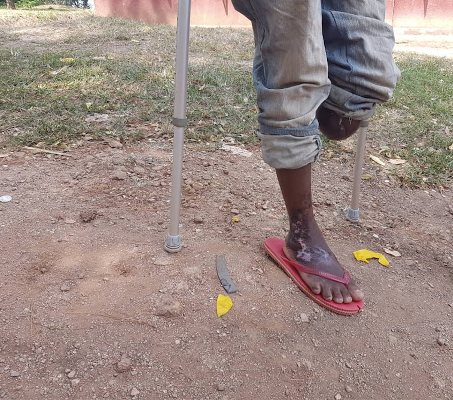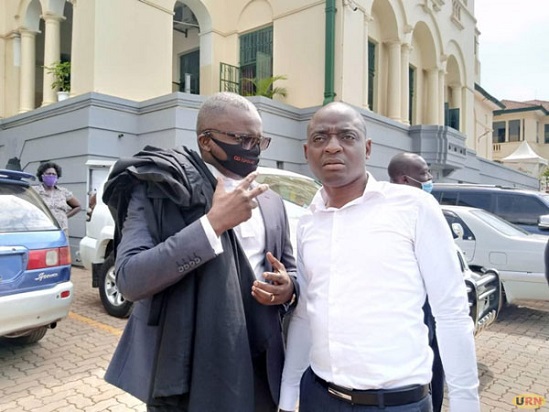The skin on Aloysius Wasswa’s brow folds as he tries in vain to suppress the pain shooting through his amputated leg.
Until April 8, 2018, Aloysius would ably walk without any support. However, his life dramatically changed when he was arrested and tortured while on remand in a government prison. The torture resulted in severe wounds that led to the cutting off of his left leg.
Today, Aloysius walks with the aid of crutches, a reality he may never fully come to terms with. His arms hurt. His amputated leg aches as he walks with tries to learn how to move about with his new walking aid.
As a 21-year-old, Aloysius knew that prisons are centres for rehabilitating suspected and convicted criminals to become good citizens. He never imagined that he would leave Kyabisenge Government Prison as a person with a disability.
Where it all began
Aloysius’ troubles started on April 8 when he was arrested by police officers in Kisita Town Council in Kakumiro District in western Uganda. Kisita is 180km west of Kampala. His paternal uncle had accused Aloysius and another young man of stealing his pig, a claim Aloysius denies.
After spending two days at Kakumiro Police Station, Aloysius was arraigned before the Grade I Magistrates Court where he pleaded not guilty to the charges. The magistrate remanded him to Kyabisenge Prison until 10 May 2018. It was his first time to be imprisoned.
As a first timer in a prison facility, the first reality that struck Aloysius was the congestion at Kyabisenge Prison. Like it’s the situation in most Ugandan prisons, Aloysius and his fellow inmates slept on the cold bare floor, most times without blankets. The inmates sat facing each other, their knees propped up to their chests. They fell asleep in that position.
“There wasn’t room to lie down in the prison ward,” Aloysius explains.
Torture at Kyabisenge prison
Within his first week in prison, Aloysius got infected with dysentery. Even then, he and other prisoners were subjected to hard labour on farmlands belonging to the prison or private individuals.
When Aloysius complained that he was sick, he was given painkillers and told to continue working on the farm. The Officer-in-Charge of Prison (O.C) cynically told him that he was not jailed to eat free food.
The following week, Aloysius felt weak on account of dysentery. He told the prison warder about his condition, explaining that he was unable to continue digging. The warder would not hear of it. So Aloysius gathered the little energy he had and continued to dig in the farm but his pace was slower.
Soon, Aloysius was several metres behind his fellow inmates. He sat down to catch his breath and gather a little more energy. The leader of prisoners, also known as Katikiro, noticed Aloysius sitting and walked towards him with accusations that the week-old inmate was planning to escape. Aloysius’ explanation that he was sick, enraged the Katikiro who began hitting him on the back and head with a baton. Aloysius bled from the head and became unconscious.
In Ugandan prisons, the Katikiro is a revered inmate. He has powers almost equal to those of a prison warden. The Katikiro decides which inmate gets punished and his word goes unquestioned by fellow prisoners.
Seeing that Aloysius had lost consciousness, the Katikiro reported to the O.C that he had punished the inmate after he tried to escape. The of O.C Kyabisenge Prison, Ferdinand Beka, took the Katikiro’s word for truth and gathered canes to inflict more pain on Aloysius.
“That evening, the O.C. began beating me mercilessly on the arms, legs, ankles and back. My cries were in vain.”
Ferdinand said by beating Aloysius, he was sending a warning to other inmates who might think of trying an escape.
“When the canes got broken, the O.C. ordered for a hoe handle and continued to beat me on the ankle, joints and feet. I had never felt so much pain in my life,” Aloysius narrates.
The Prohibition and Prevention of Torture Act, 2012, criminalises torture but the vice continues especially against those arrested by Uganda’s security forces.
Following the beatings, Aloysius could neither stand nor crawl. He was bleeding from both legs.
“The O.C had ordered that I be tied up before he started beating me up. He only stopped when some inmates and prison warders who were watching this torture began shouting that ‘he is going to die’,” he recalls.
“At that moment, Ferdinand ordered the prison warder to give him a gun, which he used to shoot me in the right foot and left leg as ‘evidence’ that I was shot while I tried to escape.”
The O.C was not done with Aloysius yet. He picked up broken pieces of the canes and used them to poke Aloysius’ bullet wound before rubbing bullet shells on it.
“It was so painful,” he says.
Hospitalisation
Later on, Ferdinand asked some prisoners to put Aloysius in a sisal sack, legs first. He was then placed in a polythene bag so that his blood doesn’t stain the O.C’s car which was being used to take the inmate to Kakumiro Health Centre IV.
“Ferdinand then asked me if he should call my wife. I said yes. When my wife came, she was overwhelmed by my condition and quickly left to inform my mother. When my mother arrived at the Health Centre, Ferdinand, who was with two prison officers, irritably told my mother that if my dad doesn’t arrive in 30 minutes, he would take me back to the prison.”
Fortunately, Aloysius’ father, Zakaria Ssekyanzi Ssalongo, arrived before Ferdinand’s deadline. The health workers subsequently told him Aloysius needed an urgent blood transfusion since he was losing a lot of blood.
The health workers at Kakumiro asked Zakaria to go and buy blood from a nearby hospital. However, when he brought the blood, Ferdinand said it was time up for the prisoner to be in the hospital.
Zakaria asked him to leave if he wanted to, but not with his son. He proposed that Ferdinand should allow two of the prison warders to guard Aloysius if he was worried that he would run away. Ferdinand refused, saying he did not have officers to guard sick prisoners.
He ordered his men to carry Aloysius back into the car. They drove off, leaving behind a father who couldn’t understand why a prison officer who had tortured his son, would deny him a blood transfusion.
Dumped in a latrine
Back at the prison, Aloysius was dumped in a latrine and locked up. The O.C said Aloysius would stain the other inmates with his blood if he was taken back to the holding cell.
In the morning, Aloysius was removed from the toilet and beaten again.
“This time, the beatings were directly on the wounds.”
One of the prison warders got concerned about the torture of Aloysius and secretly called his father, urging him to immediately come and take his son to hospital otherwise he would find him dead. However, upon arrival at Kyabisenge Prison, Ferdinand told Zakaria that it was not a visitation day.
Back to hospital
Zakaria asked why his son was being mistreated to which Ferdinand said Aloysius had tried to escape from prison and he was beaten by a village mob. Zakaria did not believe the explanation.
“I told him if it was a village mob who beat my son, they would not beat him like that.”
Ferdinand got annoyed that Zakaria was challenging his word and ordered him to leave the Prison gate. He refused. He then threatened to shoot the old man.
“I told him to go ahead and shoot me. He cocked the gun but another prison warder took the gun away,” Zakaria explains.
Realising that Zakaria was not going away, they brought his son.
“On seeing him, his condition made me break down.”
Even then, Ferdinand wasn’t moved. He told Zakaria, “if you want to treat your son, bring money.”
Zakaria forked Shs30,000 for transporting Aloysius, an allowance for Ferdinand and a prison warder.
When they arrived at Kakumiro Health Centre IV, the health workers refused to handle him, arguing that his condition had worsened. They gave them a referral letter to Mubende Regional Referral Hospital. However, Ferdinand said they needed a letter from Kyabisenge Prison referring Aloysius to Kaweri Prison in Mubende District which would then refer him to Mubende Regional Referral Hospital.

Even with a rebuke from the health workers at Kakumiro health centre, Ferdinand didn’t budge. “We again had to go to Kyabisenge Prison to get a referral letter,” Zakaria says.
Zakaria also secured an ambulance to Mubende Hospital. However, upon reaching the hospital, health workers fled from Aloysius. He was stinking. They later tried to treat him but realized that they couldn’t manage his case.
The hospital then gave a referral to Mulago National Referral Hospital in Kampala. However, the Regional Prisons Officer said they would not take Aloysius to Mulago but to Murchison Bay hospital in Luzira prison.
Instead of putting Aloysius in the ambulance Zakaria had secured, the prison officers put him in a prisons double cabin vehicle.
“A doctor at Mubende advised me to carry Aloysius on my laps otherwise he would not arrive in Kampala alive,” Zakaria narrates.
The doctor was on phone with Zakaria throughout the journey, instructing him on how to change the intravenous (IV) drip treatment being administered to his son.
As the pick-up truck pulled up at the gate of Luzira prison, Zakaria was asked to get out. He was left stranded at the prison gate as Aloysius was driven inside Luzira prison.
The next morning, he was not allowed to see his ill son. So he went to the office of the Commissioner General of Uganda Prisons Service, hoping to get clearance to see his son. One of the prison officers who work in the office of the Commissioner asked him to forgive Ferdinand who at about the same time had sent Zakaria Shs100, 000.
“He then called me claiming that he had been asked to send me that money. I was broke, so I withdrew the money and used it for my son’s treatment,” Zakaria says.
Aloysius fights for his life
After trying for days to get access to his son at the prison’s hospital in Luzira without success, Zakaria returned to Kakumiro.
“I had to return to Kakumiro to get a letter that recommends me to see my sick son in Murchison Bay,” he explains.
Upon returning to Luzira, Zakaria discovered that Aloysius had not been receiving proper medical attention. He had only been taken to Mengo Hospital for x-ray scan.
“I got annoyed. Out of frustration, I returned to Kakumiro.”
Much later, he got a call from a prisons officer at Murchison Bay, telling him to go to Mulago Hospital for his son. “When I reached Mulago Hospital, I found my son in a worse condition. He had been dropped in the accident ward. His legs and stomach were smelling so badly. Patients in the ward were complaining of the stench. We were forced to leave that ward.”
An x-ray examination of Aloysius’ legs came with bad news. The legs had to be amputated. Zakaria couldn’t afford it.
“I asked the doctors to at least save one leg. Later, Aloysius’ leg was amputated. He lost his left leg.”
On June 16, Aloysius left Mulago Hospital and was returned to Murchison Bay in Luzira Prison. The battle to have his son transferred to the Magistrates Court in Kakumiro soon begun and with the help of lawyers from Chapter Four Uganda, Zakaria secured this transfer.
When Aloysius was transferred to Kakumiro, he was again jailed at Kyabisenge Prison.
“While here, the inmates would still mistreat and hurt me by deliberately stepping on the limb that was amputated,” says Aloysius.
After spending a week in Kyabisenke Prison, Aloysius was arraigned in court again and the magistrate granted him bail for a month.
Despite his son’s temporary release, Zakaria is not happy that his tormentor Ferdinand has neither been arrested nor made to record a statement with police.
“The prisons authorities lied to me that he was on suspension, only to hear that he was transferred to another place,” says Zakaria.
“Instead, some prison officers are advising my son to plead guilty to the charges of attempting to escape from prison so that he can be jailed for two months and he is set free,” he says.
When inmates turn against each other
Torture in prisons manifests in many ways, sometimes prisoners assault new prisoners. Aloysius said each Wednesday, they would be beaten by fellow prisoners.
“We would be made to drink water from a pond, the same water we had used to bathe in,” says Aloysius.
At other times, prison warders and officers beat up inmates or order inmates to do so against each other.
Damning report
In 2011, Human Rights Watch published an 80-page report detailing incidents of torture in Uganda Prisons. The report said Uganda’s inmates endure congestion in cells, sometimes sleep hungry, sleep in turns on bare floors while covered with lice-infested blankets. The report also details how inmates must work in farms all day as fellow prisoners called Katikiro, whip them if they pause, complain of sickness, or are too weak to work.
Last year, Uganda Prisons Service Commissioner General, Dr Johnson Byabashaija warned prison wardens against torturing inmates, arguing that culprits would be prosecuted individually.
Following Aloysius’ torture, Dr Byabashaija told the press that Ferdinand had been sent on a month’s leave to pave way for investigations into the torture of inmates at Kyabisenge Prison.
As Aloysius awaits the day of his court appearance, Ferdinand is still at large. He is trying to cope with his new life with a crutch and wonders what the future holds for his three-year-old son who is supposed to start school soon.
He hopes that one day, justice will be served.
Credit: Stories4humanrights.com





